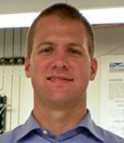Instructor List |
2024-04-18 |
The following instructors and speakers have agreed to contribute their expertise to the success of Skyline@Duke:
 |
Erin Baker Ph.D. Erin is a bioanalytical chemist with more than 18 years' experience and >100 publications utilizing ion mobility spectrometry in conjunction with mass spectrometry (IMS-MS) to study environmental and biological systems. In the last 12 years, she has worked primarily to develop high-throughput multi-dimensional analyses to quickly study numerous samples in a short time period without losing valuable information. Dr. Baker is also working with various informatics teams to design and implement software tools that automatically analyze these complex datasets. |
|
 |
Laura Dubois Laura is a research analyst at the Proteomics and Metabolomics Core Facility at Duke University in Durham, NC, directed by Dr. M. Arthur Moseley. She joined in 2008 as the third member of the facility, focusing on discovery (high resolution) and targeted (triple quadrupole) proteomics projects. She began using Skyline in early 2010 to analyze targeted LC-MS/MS data for a large clinical proteomics study in hepatitis C virus (HCV). Over the past few years, Laura has been heavily involved in the development of the facility’s metabolomics assays, including methods for polar metabolites, hydroxycholesterols, oxylipins, and lipidomics. |
|
 |
Russell Grant Ph.D. Russ is Vice President of Research and Development and National Director of Mass Spectrometry for Laboratory Corporation of America. Russ received his PhD in chromatographic and mass spectrometric technologies from Swansea University in 1995. He continued his scientific training in various industrial settings which have included: senior scientist at GSK, principal scientist at Cohesive Technologies, Technical Director at Eli Lilly, all within the drug discovery arena prior to transitioning to diagnostic chemistry and biomarker analysis in 2003 as Director of Mass Spectrometry at Esoterix Endocrinology and VP R&D at LabCorp in 2007. Russ directs assay development and validation using automation, immunoassay and mass spectrometric technologies for use in drug development and direct patient care at LabCorp. His efforts have been aimed towards guidance and enablement of biomarker translation plus analytical technologies for use in drug development and clinical diagnostics. |
|
 |
Matthew Foster Ph.D. Matt is an Assistant Professor in the Division of Pulmonary, Allergy and Critical Care Medicine at Duke University and has been on the staff of the Duke Proteomics and Metabolomics Shared Resource since 2010. Matt received his PhD in bioinorganic chemistry from The Ohio State University and post-doctoral training in nitric oxide biology at Duke. His current research interests are primarily in application of proteomics to the study of airway biology and disease. He leads a variety of basic and clinical science projects for the DPMSR utilizing MS1-based quantitation, data-independent acquisition and parallel reaction monitoring, with a particular emphasis on quantitative proteomics of biofluids and secretomes. |
|
 |
Michael J. MacCoss, Ph.D. Mike became interested in biomedical applications of mass spectrometry while working in Dr. Patrick Griffin’s protein mass spectrometry lab at Merck Research Laboratories. He obtained a Ph.D. with Professor Dwight Matthews and pursued a postdoc with Professor John R. Yates III. In 2004 he started the MacCoss lab at the University of Washington and it became obvious that while mass spectrometry data could be collected quickly and robustly, the lack of computational tools for the visualization and analysis of these data was a stumbling block. In 2009 he recruited Brendan MacLean with the goal of developing professional quality software tools for quantitative proteomics. Mike has worked closely with the Skyline development team and our outstanding group of laboratory scientists and collaborators to ensure that our software uses analytical approaches that have been thoroughly vetted by the mass spectrometry community. |
|
 |
Brendan MacLean Brendan worked at Microsoft for 8 years in the 1990s where he was a lead developer and development manager for the Visual C++/Developer Studio Project. Since leaving Microsoft, Brendan has been the Vice President of Engineering for Westside Corporation, Director of Engineering for BEA Systems, Inc., Sr. Software Engineer at the Fred Hutchinson Cancer Research Center, and a founding partner of LakKey Software. In this last position he was one of the key programmers responsible for the Computational Proteomics Analysis System (CPAS), made significant contributions to the development of X!Tandem and the Trans Proteomic Pipeline, and created the LabKey Enterprise Pipeline. Since August, 2008 he has worked as a Sr. Software Engineer within the MacCoss lab and been responsible for all aspects of design, development and support in creating the Skyline Targeted Proteomics Environment and its growing worldwide user community. |
|
 |
Arthur Moseley, Ph.D. Arthur is the Director of the Proteomics and Metabolomics Shared Resource at Duke, and is an Associate Research Professor in the Department of Medicine. He came to Duke to start-up the Proteomics Resource in 2007, after sixteen years managing mass spectrometry labs at GSK. For the last six of those years, he managed the proteomics mass spectrometry labs in the US and UK. Arthur received his PhD in 1990, in the laboratory of Professor Jim Jorgenson at UNC, where his research addressed the coupling of CE and nanoscale LC with mass spectrometry for the analysis of peptides (aka - proteomics before the term proteomics was coined by Marc Wilkens in 1994). Since starting up the lab at Duke, with the assistance of Dr. Will Thompson, he has overseen the lab’s expansion from three instruments to eleven instruments, and the staff expansion from 2 to 11 scientists, including four Research Professors. The Resource supports all basic science departments and clinical science departments in the School of Medicine at Duke, and the resource has completed >1,200 projects for ~200 Principal Investigators. His research interests covers the range from ‘omic discovery to targeted verification, validation and application – with a keen interest in ensuring data quality at each stage via quantitative metrics to facilitate translational studies. |
|
 |
Lindsay Pino Lindsay Pino is a Ph.D. candidate in the UW Genome Sciences program. Under the joint advisorship of Drs. Michael J. MacCoss and William Stafford Noble, she is investigating how genetic and environmental perturbations alter the yeast proteome by incorporating analytical chemistry, molecular biology, bioinformatics, and machine learning. Her research interest is in high dimensional mass spectrometry proteomics, which combines her formal undergraduate training in biochemistry and molecular biology with her high-throughput ‘omics post-bacc experience and her current computational training. Her doctoral thesis work explores potential molecular signatures of longevity in yeast. Before coming to the University of Washington for graduate school, she spent two years in South Korea as a Fulbright scholar and then three years working as a research associate at the Broad Institute of MIT and Harvard. |
|
 |
Chris Shuford, Ph.D. Chris is Technical Director for research and development at LabCorp’s Center for Esoteric Testing in Burlington, North Carolina. Chris received a B.S. in Chemistry at the Longwood University and obtained his Ph.D. from North Carolina State University under the tutelage of Professor David Muddiman, where his research focused on multiplexed peptide quantification using protein cleavage coupled with isotope dilution mass spectrometry (PC-IDMS). In 2012, Chris joined LabCorp’s research and development team as a scientist where his efforts have focused on development of multiplexed and single protein assays for clinical application, with particular interest around the effect of protein digestion on the throughput and accuracy of isotope dilution assays. |
|
 |
Erik Soderblom, Ph.D. Erik currently holds a joint appointment as a Research Scientist at Duke University’s Proteomics and Metabolomics Core Facility and as an Assistant Research Professor in Duke University’s Department of Cell Biology. He received a PhD in Molecular and Structural Biochemistry from North Carolina State University in 2008, prior to joining the Core Facility. His expertise lies in the utilization of various liquid chromatography-mass spectrometry (LC-MS) platforms to support a wide variety of research efforts from small scale basic science studies to larger scale clinical proteomics studies. Dr. Soderblom has over 14 years’ experience in differential expression proteomics using single and multi-dimensional nanoscale capillary chromatography coupled to high-resolution mass spectrometers, targeted proteomic analysis using triple quadrupole mass spectrometers (MRM) or high-resolution mass spectrometers (PRM), and comprehensive analysis of post-translational modifications such as phosphorylation and acetylation. Dr. Soderblom currently co-instructs courses on various aspects of LC-MS related topics at ASMS, MSACL, and Cold Spring Harbor. |
|
 |
J. Will Thompson Ph.D. Will is the Assistant Director of the Duke Proteomics and Metabolomics Shared Resource, and Assistant Research Professor in the Department of Pharmacology and Cancer Biology. He received his Ph.D. in Ultrahigh Pressure Liquid Chromatography from the laboratory of Dr. Jim Jorgenson at the University of North Carolina at Chapel Hill, and subsequently joined the Disease and Biomarker Proteomics group led by Dr. Arthur Moseley at GlaxoSmithKline. In 2007, Dr. Thompson assisted Dr. Moseley in founding the Duke Proteomics Core Facility, which as of winter 2017 has 10 full time scientists. Dr. Thompson has overseen the expansion of the group's efforts into small molecule and metabolomics analysis, which now represents roughly 40% of the work of the Shared Resource. His research in part focuses on application of novel proteomics and targeted metabolomics assays to clinical and basic science research applications, with special emphasis on Alzheimer's Disease. The Core has completed over 1200 projects for nearly 200 principal investigators since 2007, and works with investigators both inside and outside the Duke School of Medicine. |